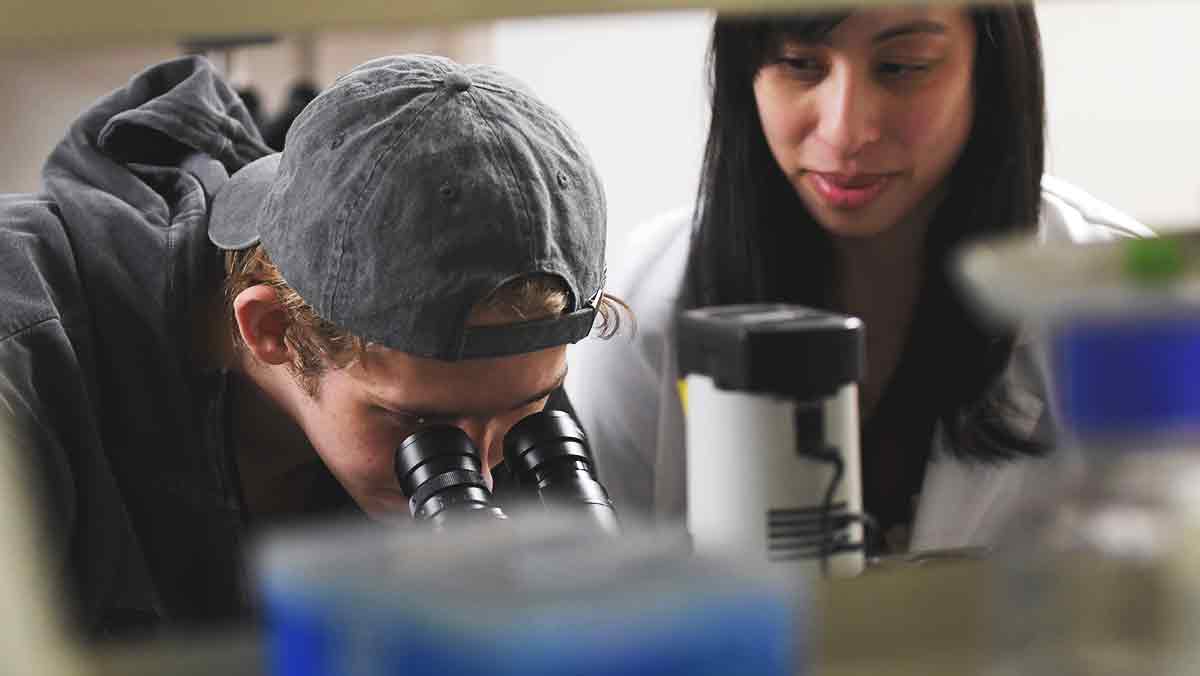Master of Science in Biomedical Engineering

Wayne State University's Biomedical Engineering (BME) program, among the nation's oldest, is renowned for its pioneering research in injury biomechanics. By equipping students with essential theories and techniques, it addresses pressing societal challenges such as epidemics, premature mortality, pain, and disability from trauma and aging. By nurturing expertise in biomedical engineering, the program plays a pivotal role in advancing healthcare and contributing to societal well-being.
Program highlights
- Flexibility- full or part-time learning
- Choose the thesis or non-thesis track
- Four specializations offered
- Apply as a recent college graduate or working professional
- Funded research at the forefront of the biomedical industry
- GRE optional
What will you learn in the program?
After completing a Master of Science in biomedical engineering at Wayne State University, you will have the skills needed to lead advanced research across multiple sectors, and drive innovation in biomedicine.
Specializations within the program encompass critical areas such as:
- biomedical imaging and instrumentation
- computational and systems biology
- injury and musculoskeletal biomechanics
- tissue engineering and biomaterials.
With these focused tracks, you'll explore your chosen interests in greater depth, developing specialized expertise along the way.
Upon completion of the program, you’ll be equipped to:
- Apply math, science, and engineering concepts to identify, formulate and solve problems in biology and medicine.
- Design and conduct scientific experiments and analyze and interpret the resulting data.
- Partner with physicians and clients to apply mechanism of injury knowledge to develop solutions.
Master of Science in biomedical engineering curriculum
Wayne State’s 30-credit M.S. in biomedical engineering can be completed with a six-credit thesis (Plan A) or without a thesis (Plan C).
Plan A
Requires 3 required courses (9 credit hours), 13 general courses (minimum of 6 credits in BME), 6 credits at the 7000-level or above (minimum of 3 credits at 7000 level or above), Directed Study (maximum of 4 credits), Master’s Thesis Research (8 credit hours), Internship (maximum of 6 credits)
Plan C
Requires 3 required courses (9 credit hours), 21 general courses (minimum of 12 credits in BME), 6 credits at the 7000-level or above (minimum of 3 credits at 7000 level or above), Directed Study (maximum of 4 credits), Internship (maximum of 6 credits) and non-BME graduate level engineering or medical school courses (maximum of 6 credits).
The 3 required courses are Quantitative Physiology, Computer and Mathematical Applications in Biomedical Engineering and Seminar in Biomedical Engineering.
Review the M.S. in biomedical engineering program curriculum
Real-world experiences and opportunities
You’ll have the opportunity to do multidisciplinary research alongside esteemed faculty mentors and peers, shaping the future of healthcare technologies. Our faculty brings expertise in a wide array of areas such as biomedical imaging, computational systems biology, musculoskeletal biomechanics, tissue engineering and biomaterials, fostering an environment ripe for exploration and innovation.
Explore biomedical engineering's research.
Situated in the heart of Detroit, Wayne State University offers an urban environment teeming with connections to industry giants like Ford, GM and Stellantis. This proximity provides unparalleled networking opportunities, leading many graduates to seamlessly transition into roles within these companies or their subsidiaries. Alumni have also found successful opportunities with renowned companies and/or organizations such as Medtronic, Zimmer, Stryker, Lear Corp., Humanetics, Terumo Cardiovascular Systems, Pfizer and Beaumont Hospital.
Admissions
Admission to this program is contingent upon admission to the Graduate School. In addition, the minimum requirements for admission into the M.S. biomedical engineering program are:
- Official transcripts from an accredited institution showing completion of an engineering baccalaureate degree. Students with a baccalaureate degree from a non-engineering discipline that is related to biomedical engineering (e.g. life science) will be considered for admission to the program if they have prerequisite coursework in Calculus (1 and 2) (Differential Equations is recommended but not required) and Physics (1 and 2) and have passed these courses with a grade of 'B' or better. Applicants are expected to have some background in a programming language (e.g. MATLAB, C, C++, Java, Python, R, FORTRAN, etc). Courses from online platforms such as Coursera, EdX and MATLAB Onramp may be used to gain such knowledge.
- A grade point average (GPA) of 3.0 or higher on a 4.0 scale will be considered for regular admission and GPA between 2.8 and 3.0 will be considered for qualified admission.
- International applicants may submit an unofficial copy of their academic transcript, if admitted, a course-by-course transcript evaluation is required.
For graduate admissions and application concerns, contact the BME graduate program coordinator.
Maryam Adel
BSBME, '23 & MSBME, current student
Wayne State University offered a remarkable biomedical engineering program, standing out with its research-centric approach and robust support system. It was this blend of academia, research opportunities, and the welcoming atmosphere that drew me to Wayne State over other institutions.
Maryam Adel
BSBME, '23 & MSBME, current student